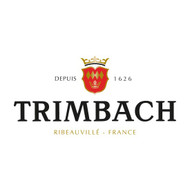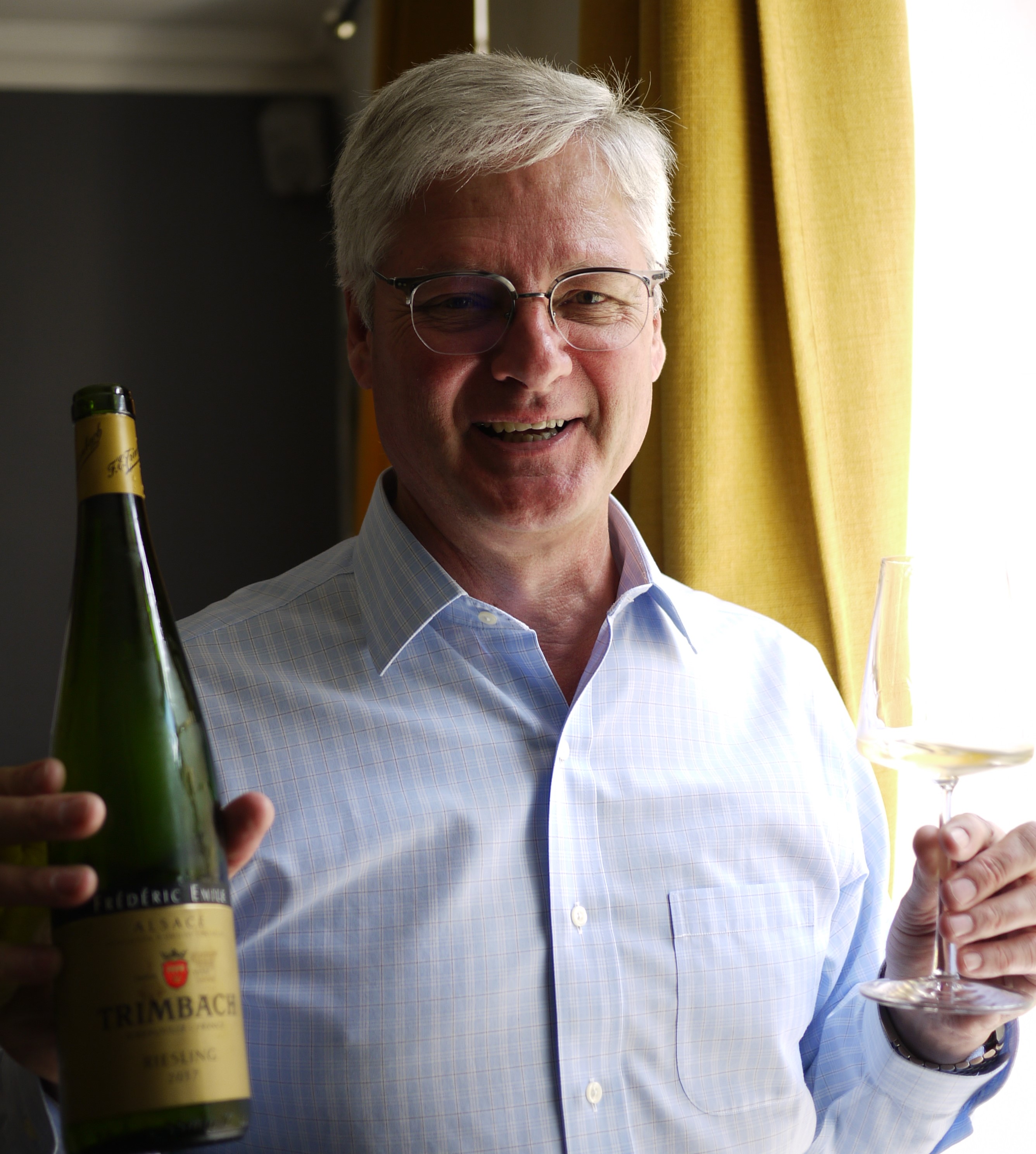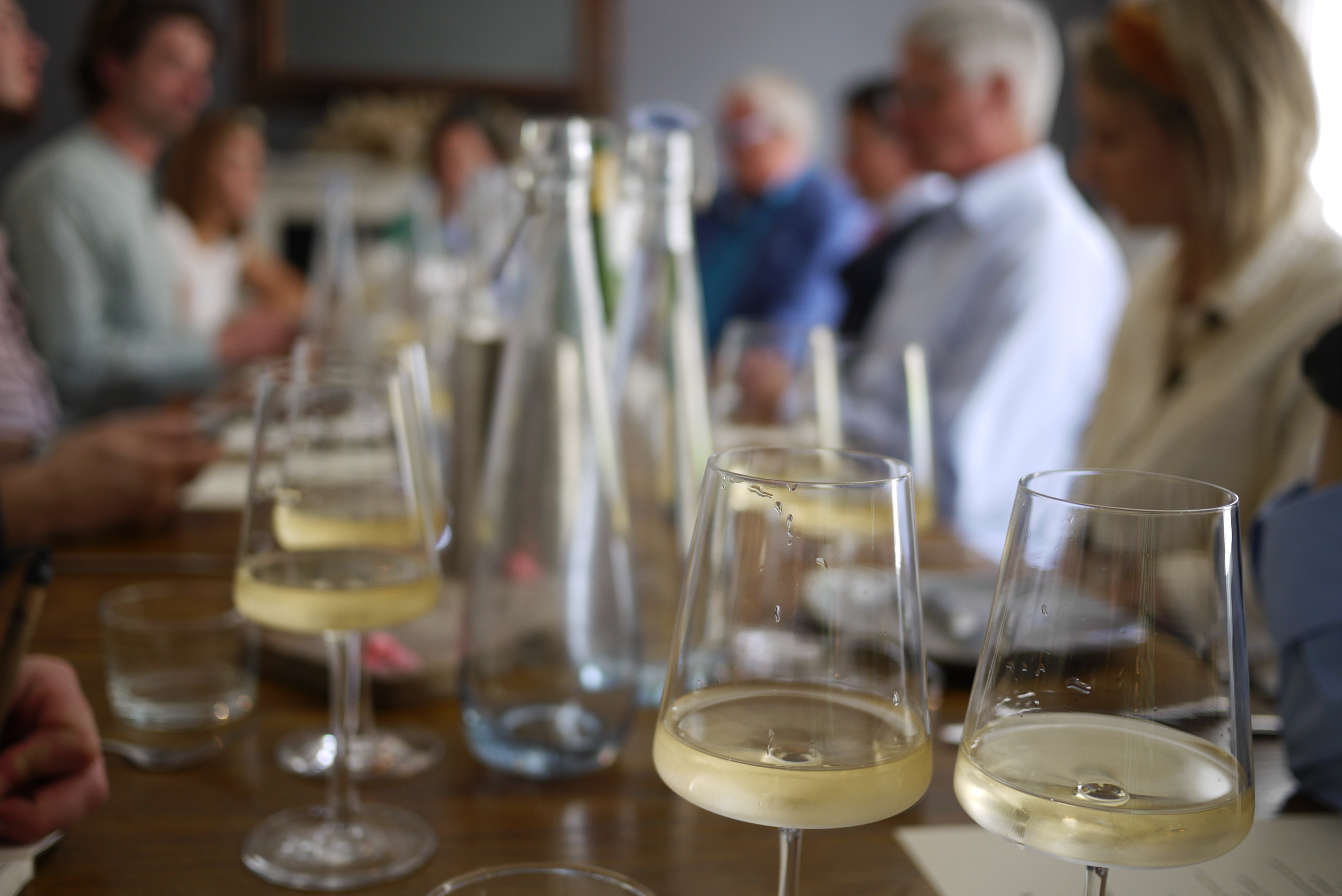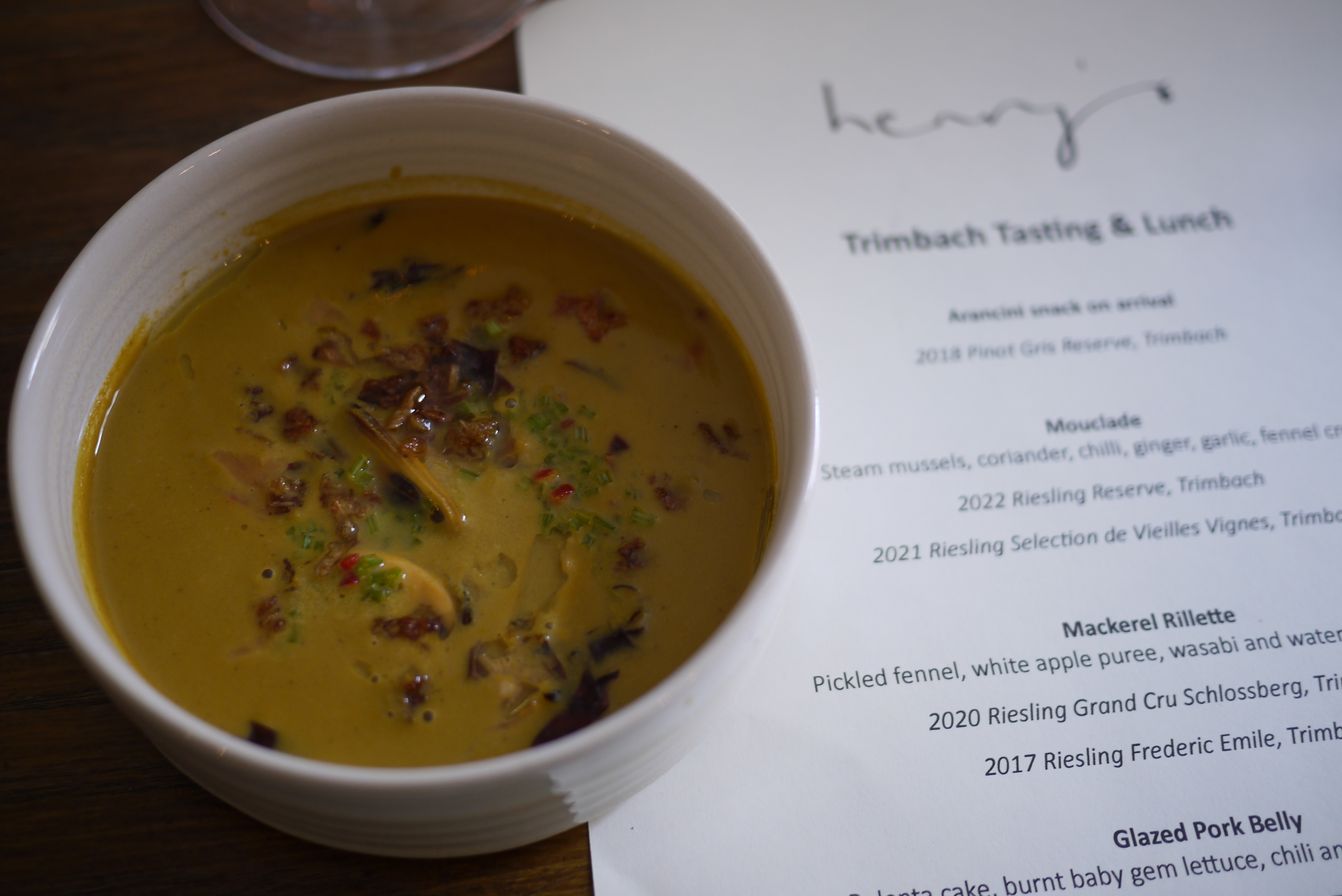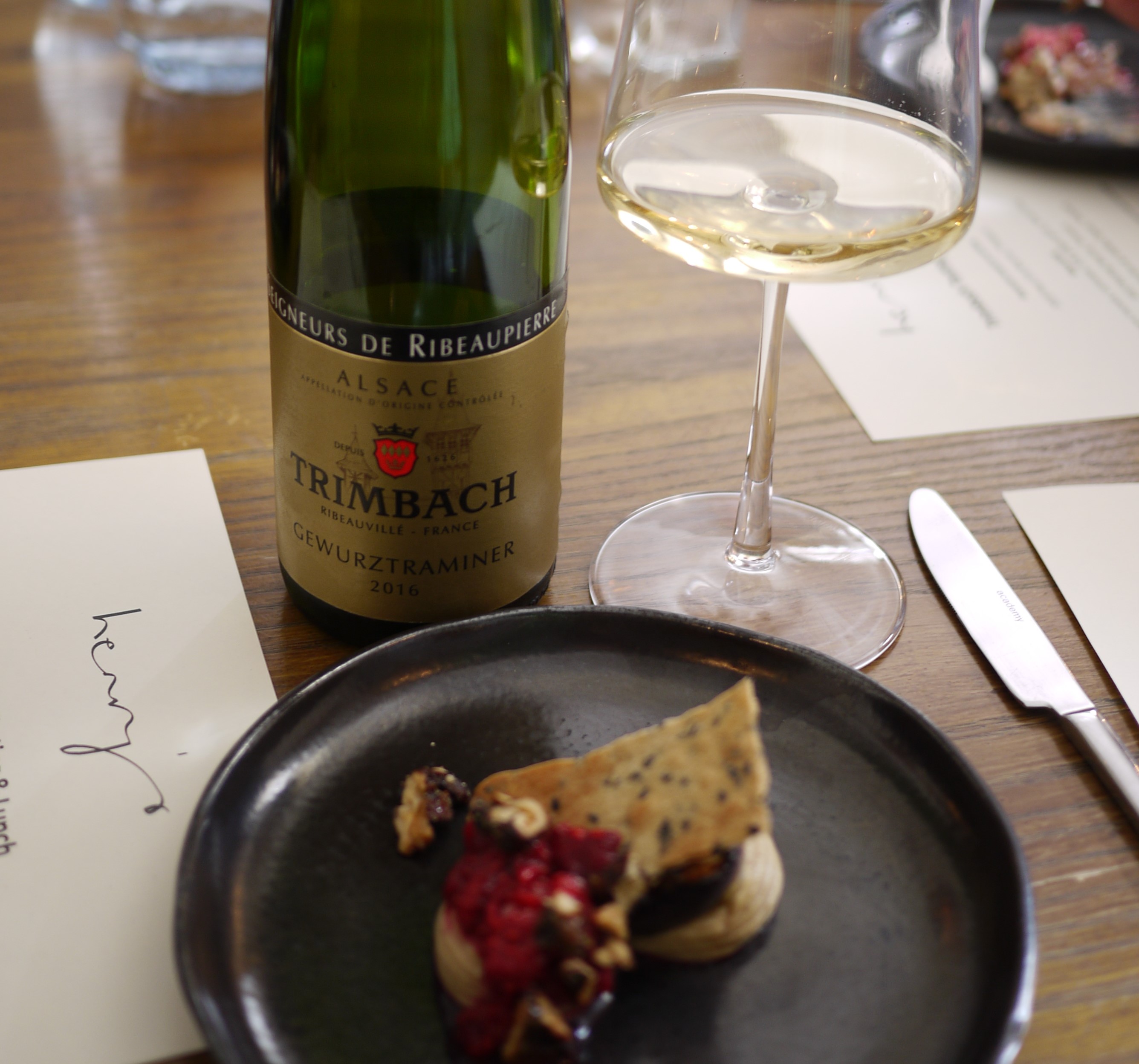Lunch with Jean Trimbach at Henry’s Restaurant, Bath
Tom King, Fine Wine Manager on 8 Aug 2024
When I was invited to a lunchtime tasting with Jean Trimbach at Henry's Restaurant, Bath—as a guest and not the organiser—I leaped at the chance. The opportunity to taste the wines of an iconic producer alongside an exquisite menu was one not to be missed.
The Family
The family arrived in Alsace from the Swiss village of Trimbach in the 1500s to mine silver, and the original Jean Trimbach switched to vine-growing and winemaking in 1626. The present Jean, and brother, Pierre, are the 12th generation of the wine dynasty, and their children, Anne, Frederique, Pauline and Julien, have assumed various roles within the business, which celebrates its quatercentenary in 2026.
The Domaine
Trimbach produces wine from an estate of 65 hectares of vineyards, mostly around the town or Ribeauvillé. Longstanding relationships with growers who farm a further 60 hectares make up the balance of the family’s wine output. Much of this has been cultivated organically without certification for many years, and from the 2023 vintage onwards it will be 100% certified organic.
The Future
Despite being France’s northernmost major vineyard region, Alsace has dry, sunny and warm summers, thanks to the rain shadow cast by the Vosges mountains. Historically, this has been an advantage, with more consistency from year to year than Burgundy, Bordeaux or Champagne. However, as the climate warms, Jean foresees upcoming challenges, and anticipates changes, such as planting on north-facing sites, and producing wine from different varieties. Syrah, Grenache and others are already being trialled in the region.
The Occasion
The insights of tasting with such a charming and knowledgeable presenter lead to a far deeper appreciation of each wine, and the heritage and artistry that has brought it into being. That would have been more than enough to make for a satisfying experience, but Henry’s chef, Peter Lewis, also kindly explained the inspiration and effort behind each of the dishes, making for a truly memorable experience.
2018 Pinot Gris Réserve £26.50
The warmth of the vintage meant that some pink pigment from the grape skins coloured the juice, giving this white wine a delicate blush appearance. It has subtle notes of melon, peach and lychee, a creamy, medium-bodied texture and a sustained finish. Also called Pinot Beurot, this historically formed part of Burgundy’s finest wines, however it proved better-suited to Alsace's dry climate, and now accounts for 17% of production.
“Pinot Gris is my Meursault.”
— Jean Trimbach
The gentleness of the Pinot Gris made it a great match for Arancini with roasted peppers and home-dried tomatoes, which had a distinctive flavour and the satisfaction of risotto, juxtaposed to a crispy panko crumb coating.
2022 was another warm year, and the Riesling Réserve shows this with a gloriously easy going style that makes it one of the friendliest Rieslings I have tasted. It has delicious green apple, tropical fruit, beeswax, honey and sun-warmed pine forest scents. This comes from vineyards around the town of Ribeauvillé, and cool air flows down a combe that extends 14km into the Vosges, helping to mitigate the summer heat. Riesling represents 22% of Alsace’s production, but 55% of Trimbach’s.
2021 Riesling Sélection de Vieilles Vignes £37.50
From the cooler 2021 vintage and two plots of old vines on marl-limestone soil at the village of Hunawihr, this has a richer, almost oily, texture and fabulous, grippy acidity. This is a deeper, more dramatic Riesling, a more extreme wine of tension, contrast and concentration. I love it!
The first two Rieslings were paired with velvety Mouclade, a Breton curried soup, containing steamed mussels, and aromatic with coriander leaf, chilli, ginger, fried garlic and fennel cress. Réserve was a good match, but Vieilles Vignes was an awesome one, standing up to the bold flavours and cleansing the palate between spoonfuls.
2020 Riesling Schlossberg Grand Cru £66.50
Only 400-500 six-bottle cases of this are made per year from Trimbach’s 1.6 hectare terraced plot on this steep, granite, Grand Cru site. The wine has a dewy freshness that evokes quiet summer mornings, and hints at scents of beeswax and lime pith. Fabulously pure, fine and balanced, it is already a lovely wine that promises to get better and better.
2017 Riesling Cuvée Frédéric Emile £72.00
Always a blend of two Grand Crus–Osterberg for acidity and backbone, Geisberg for luxurious polish. Complex soils: marl, sandstone and muschekalk (shelly limestone). The Trimbachs get this started on its ageing journey, but it will comfortably cellar for another 20 years or more. It has a more developed, more pronounced Riesling character, showing lime juice and honey, with a waxy richness. Great already, there’s still more to come.
The Grand Cru Rieslings accompanied Mackerel Rillettes, selected because this fish is best in high summer. They were made from a combination of poached and cedar-smoked mackerel, and served with pickled fennel, white apple puree and wasabi and watercress emulsion. The rich and fairly bold flavours especially suited the more emphatic character of Cuvée Frédéric Emile.
2017 Pinot Noir Réserve Cuve 7 £35.00
Named after the number of the vat in which it was first made(in 1985), Cuve 7 is from the Rotenberg site, red with high iron oxide content to the soil. It has juicy, ripe fruit, a lot of savoury, herbal complexity and a smoky hint.
“I drink a lot of Pinot Noir, and when I drink this one, I am not unhappy.”
— Jean Trimbach
Cuve 7 paired with glazed pork belly was an inspired match. Trimbach makes Pinot on the leaner, drier side and the richness of the food made for a complete, complementary whole. An extraordinary amount of preparation goes into this dish: the meat is salted, pressed and poached over several days. The accompanying jus is a master stock that has beenused for poaching five times, before reducing with star anise, galangal and lime leaf for an unctuous texture and intense flavour. Insane—but brilliant.
2016 Gewürztraminer Cuvée des Seigneurs de Ribeaupierre £47.00
Ribeauvillé is overlooked by three ruined castles, and this wine is named after the lords who once occupied them. This turned out to be one of my two favourite wines of the tasting. It has a rich, golden colour, and exciting, complex notes of lychee, galangal and lemongrass. The texture is sumptuous and rich, and yet the wine is fresh and superbly-balanced. It is wonderful already but Jean says that this can keep for as long as Cuvée Frédéric Emile – 20+ years. Gewürztraminer isn’t everyone’s thing, but I strongly encourage anyone to try this gorgeous wine to have their preconceptions challenged. Utterly delicious.
“It is not off-dry. It has a dry finish, with just a kiss of sweetness, a caress.”
— Jean Trimbach
The final food pairing was a Blue Cheese Royal, a creamy, intense curd made over a mind-boggling three days of slow cooking. A little goes a long way, and I found myself savouring tiny dabs of it over a matter of minutes. Gewürztraminer was about the best match possible for a dry wine, although such intensity in the food could have taken a sweeter Vendange Tardive.
The Recommendation
I strongly recommend Henry’s imaginative cuisine and friendly service, within an informal setting. Whether you’re a Bath resident or a visitor, this is well worth a visit. Trimbach’s phenomenal wines get my enthusiastic endorsement. Re-create our tasting with the Trimbach Tasting Case, containing one bottle each of the above wines (except the Schlossberg) and saving 30%.
£175 special trial price (£250 retail)
The case contains one bottle each of:
- Pinot Gris Réserve
- Riesling Réserve
- Riesling Sélection des Vieilles Vignes
- Riesling Cuvée Frédéric Emile
- Pinot Noir RéserveCuve 7
- Gewürztraminer Cuvée des Seigneurs de Ribeaupierre

